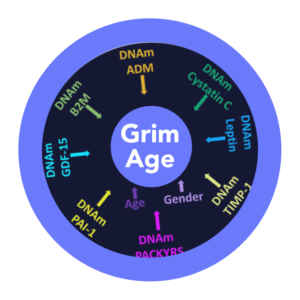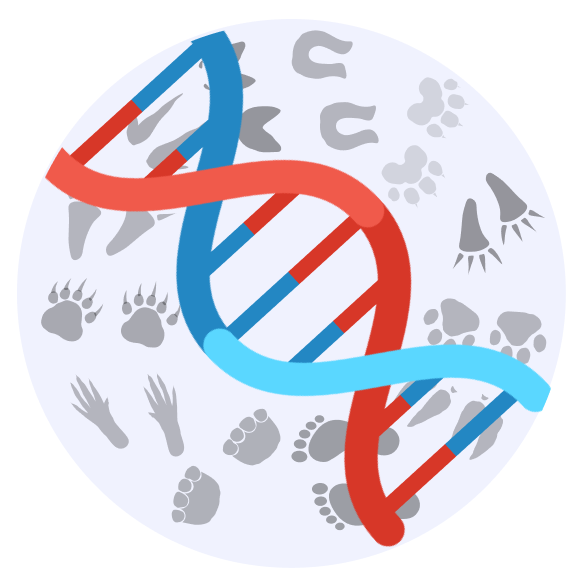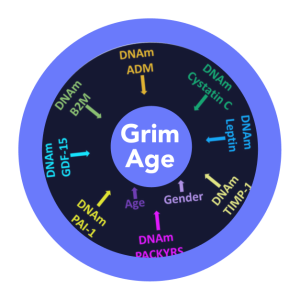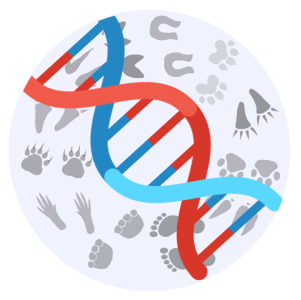Stay up-to-date on latest anti-aging research from top longevity scientists.
World's Only Third Generation* Epigenetic Clock
Universal Horvath Test

DISCOVERY NEWS: Unveiling the Universality of Epigenetic Aging Markers
Published in Nature Aging, the Universal Horvath Clock reveals the remarkable conservation of key epigenetic aging markers across all species.
Derived from an extensive body of research encompassing DNA methylation and epigenetic clocks spanning more than 180 mammalian species, ranging from majestic whales to tiny marsupials, as well as our human counterparts and beloved pets, this third-generation clock revolutionizes our understanding of aging and paves the way for cutting-edge anti-aging research.
In contrast to the prevailing model of aging predicated on the accumulation of cellular damage, the Universal Clock introduces an alternative perspective, known as the “pseudo-programmatic theory of aging.” This paradigm shift represents a potential stride toward unraveling and potentially “deprogramming” the aging process itself.
At the heart of this research is the discovery of a select number of highly conserved epigenetic age markers shared across animals. The Universal Horvath Clock is an unprecedented tool for researchers and longevity pursuers alike. This third generation epigenetic clock enables us to construct a bridge between species, connecting aging and longevity discoveries in one species to anti-aging treatments and therapies in others, including us humans. It sets the stage for cutting-edge translational anti-aging research and innovation.
Learn more in our Open Access Paper Universal DNA methylation age across mammalian tissues (2023)” in Nature Aging.

What is a "3rd Generation" epigenetic clock biological age test?
Discovered in 2013, an Epigenetic Clock is a "molecular timer" that uses certain epigenetic markers that appear during development and as we age to estimate biological age as well as predict a host of age-related health risks.
1st Generation Epigenetic Clocks

First Generation Epigenetic Clocks were the first to discover evidence that DNA methylation patterns or changes in certain epigenetic markers are linked with our age!
These clocks were trained and built to estimate our actual chronological age, irrespective of health status or health risks.
Examples of 1st Gen Clocks:
- Horvath (2013) pan tissue clock
- Hovarth (2018) skin & blood clock
2nd Generation Epigenetic Clocks

Second Generation Epigenetic Clocks were trained and built to estimate biological age and mortality risk.
These clocks were a significant improvement over so-called “first gen” clocks due their ability to predict time-to-death, their strong association with a number of age-related diseases and actionable insight into key mechanistic components of individual aging.
Examples of 2nd Gen Clocks:
- Horvath-Levine DNAm PhenoAge (2018)
- Horvath GrimAge (v1 2019, v2 2022)
3rd Generation Epigenetic Clocks

Third Generation or “Universal” Epigenetic Clocks were designed to understand and unlock what is aging across different animals and enable cutting-edge translational longevity research.
Trained on data from over 180 mammalian species, 3rd Gen Clock were built to estimate one’s universal biological age based on the most conserved components of aging across species and tissue types.
3rd gen clocks help us understand our aging across different animals and enable translational medicine by linking discoveries in one species with possible longevity treatments in others including humans!
Universal Horvath Clock (2022) is currently world’s only third generation epigentic clock.
How We Measure Aging
Biological Aging Tests Developed & Used by Top Longevity Researchers
GrimAge: 2nd Gen Epigenetic Clock

- (Second generation Epigenetic Clock)
- GrimAge, our Epigenetic Age Test, predicts your biological age, based on DNA methylation, basically changes in your DNA over time.
- Specifically, for our epigenetic age test, we use GrimAge (an Epigenetic Clock), which has been found to strongly correlate with biological age and shown to be a predictor of morbidity and mortality. In fact, GrimAge has outperformed all other epigenetic or DNA methylation clocks.
- Developed in the Horvath lab at UCLA using historical biobank data from large population studies and validated in large independent studies across a wide variety of human cell types and tissues. It has been used and cited in over 1000 papers and studies.
- Beyond being the world’s most accurate biological age predictor, our epigenetic test also provides key aging risk factors associated with organs and systems age as well as immunosenescence (immune system aging).
- Test requires a blood sample from a home kit collection and takes as little as 5-10 minutes, which is then returned for processing by express mail.
Horvath Universal Clock: 3rd Gen

- (Third generation Epigenetic Clock)
- Universal Horvath Test is a third generation epigenetic biological age test and predicts your biological age based on the most conserved aspects of aging found in all animals.
- The test results are based on research into aging in over 180 mammal species and the remarkable discovery of key epigenetic aging markers found universally.
- It is currently the world's only third generation epigenetic clock, designed to understand and unlock what is aging across different animals and enable cutting-edge translational longevity research.
- Test requires a blood sample from a home kit collection and takes as little as 5-10 minutes, which is then returned for processing by express mail.
Recent Media Coverage & Interviews
Frequently Asked Questions
Biological age refers to your age on a biological level compared to your chronological age or how many birthdays have passed for you.
Biological age tests look at changes in your biology that are indicative of biological aging. In our case, our biological age test uses what is called an epigenetic clock to calculate your biological age.
Fortunately, your biological age is modifiable, meaning you can change it. Tracking your biological age can help you see changes over time and understand the impact diet, lifestyles changes, and anti-aging treatments are having on your rate of aging.
After ordering, you’ll receive different instructions depending on which test you’ve obtained, or which program you’ve entered. In each case by email we’ll detail how the test works and the steps ahead necessary for collection.
For everyone obtaining testing, this initial email will include:
- A link to an online survey to register your test kit and to complete a brief intake questionnaire;
- For the PhenoAge test in the U.S., a form that enables you to obtain your blood draw, along with instructions on how to schedule an appointment; and
- For the GrimAge epigenetic age test, instructions on how to collect and return your at-home blood collection kit.
You will receive your initial test report and results as soon as each of the above steps have been completed. For the PhenoAge blood test, this is typically within 1-2 weeks after your blood draw. For the Grimage epigenetic clock test, the typical turnaround time is 3-4 weeks after return of your sample.
Once you receive your initial results, you’ll also be able to book a 1-on-1 consultation with our team to discuss.
Each month you’ll also receive separate notifications about our community events, where we discuss new treatments and longevity strategies.
Epigenetics is the study of how genes are turned off and on during an animal’s lifetime, including humans.
A Greek word meaning “above genetics”, epigenetics is the study of changes in gene function that occur without detectable changes to DNA sequence. What this means is that your gene expression (like what proteins your cells produce) changes but your gene sequences themselves do not change.
Epigenetics most often involves changes that affect gene activity and expression. These epigenetic changes can occur due to normal biological development but they can also result from external or environmental factors like food choices, stress levels or even injury.
A genetic or DNA test looks at what your DNA contains whereas an epigenetic age test measures various epigenetic changes on our DNA itself. Unlike DNA, your epigenetics are modifiable.
Many cells in the body have an “epigenetic clock” that keeps track of how quickly they are aging or, more accurately, how much damage has been done since they were created.
Our test provides your biological age as well as various key drivers of your aging.
DNA methylation is a process where methyl groups are added to DNA to influence gene expression, and which are critical for normal human development, defining cell identity, as well as for rejuvenation and reprogramming. Highly accurate estimators of chronological age have been developed are known as epigenetic aging clocks, which can predict chronological age through development and across the lifespan (Horvath 2013, Horvath & Raj 2018).
Increasingly these clocks are also being used as a measure of biological age as certain measures – most notably GrimAge (Lu 2019, Li 2020), which is able to predict future morbidity and mortality risk. GrimAge also performs well for predicting functional decline and onset of major age-related diseases, including heart disease, cancer onset, multi-modal measures of brain health, kidney disease, fatty liver, respiratory function, and more (Lu 2019, Hillary 2018, Hillary 2020, McCrory 2020). These peer reviewed and independent studies have also shown that it performs reliably across large diverse populations.
Many researchers conclude today that overall epigenetic clocks now represent the most robust measure of biological age (Li 2020, Jylhava et al 2017, Justice & Kritchevsky 2020).
We currently ship to the United States, UK and Europe and serviced by labs in Los Angeles, USA, and Manchester, UK.
Please contact us if you are located elsewhere and are still interested in purchasing a test or participating in an anti-aging trial.
WARNING: TESTS INTENDED FOR RESEARCH PURPOSES ONLY
These statements have not been evaluated by the Food and Drug Administration. These products are not intended to screen, diagnose, treat, cure, or prevent any disease or condition or assess risk of any disease or condition. Unless advised by your healthcare professional, biological age should not be used to determine or alter any age-related health or medical treatments based on your chronological age.
Let’s Stay In Touch
© 2023 Clock Foundation.
